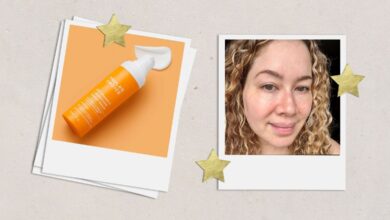These Skin Benefits of Exercising May Motivate You To Work Out

A recent Japanese study divided a group of 61 healthy, sedentary, middle-aged women into two groups who exercised twice a week for 16 weeks—one group did only an aerobic training program, the other only a resistance training program using weight machines—in an attempt to differentiate the effects of each type of training on the skin.
“The effects of aerobic training and resistance training on our body are known to be different, i.e., resistance training specifically induces muscle hypertrophy [increased muscle size], whereas aerobic training improves cardiovascular fitness,” says Satoshi Fujita, PhD, study co-author and professor with the Faculty of Sport and Health Science at Ritsumeikan University in Kyoto, Japan. “So, we hypothesized that aerobic training and resistance training have different effects on skin as well.”
At the end of the study’s 16 weeks, both groups experienced improved skin elasticity and upper dermal structure, but the group who solely did weight training also had improved dermal thickness. That’s important because the dermis—an elastic support structure lying just underneath the skin’s outer layer (epidermis) that contains nerves, blood vessels, and glands—thins progressively over time, contributing to skin sagginess and other signs of wear and tear.
Experts In This Article
- Amy McClung, MD, Amy McClung, MD, is a board-certified dermatologist in Austin, Texas.
- Satoshi Fujita, PhD, Satoshi Fujita, PhD, is a researcher and professor with the Faculty of Sport and Health Science at Ritsumeikan University in Kyoto, Japan.
“This is pretty exciting research since aging causes a deterioration of the dermis, including decrease in elasticity and decrease in dermal thickness,” says Amy McClung, MD, a board-certified dermatologist in Austin, Texas. “In the study, resistance training increased dermal thickness by increasing or decreasing different factors that contributed to dermal thickness, rather than thinning.”
How exercise impacts skin appearance
When we exercise, our bodies produce increased or decreased levels of different cytokines (proteins that aid in cell-to-cell communication), hormones, metabolites, and other factors that affect skin makeup, explains McClung. When blood samples from study participants were analyzed at the start and end of the training programs, both aerobic and resistance training caused the production of factors that reduce inflammation and increase the expression of genes that influence production of collagen and other skin proteins.
However, the specific factors each type of training produced differed. Most notably, only resistance training produced factors that increased the production of skin proteins including biglycan. Researchers theorized that the increase in biglycan with resistance training may explain why only this type of training led to increased dermal thickness.
“Biglycan is an important component of skin protein known to decrease with age” and sun exposure, says Dr. Satoshi, noting that, in animal studies, mice who didn’t produce the protein had thinner dermises.
The skin benefits of exercising as part of your beauty routine
You’re probably thinking, okay, all this is great but how much weightlifting do I need to do to make my skin look better? While study participants worked out twice a week doing three sets of 10 reps of progressively heavier loads on six weight-stack machines—leg curl, leg extension, arm curl, row, shoulder press, and chest press—Dr. Satoshi says it may be possible to see results even without that much training.
“We believe that less resistance training also has an effect on the skin as muscle hypertrophy was not the main factor for skin improvement,” he says. “However, to induce an anti-inflammatory effect, we recommend weight training that works the larger muscles of the body, preferably both upper and lower body muscles.”
Although study participants used weight machines, resistance training can be done with bands, kettlebells, or even your own body weight. And make sure to also incorporate aerobic training which will benefit your cardiovascular system along with your skin health, advises Dr. McClurg.


